by Susan Willett
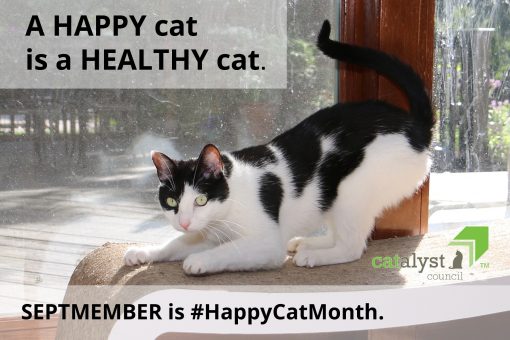
You love your cat. You feed her the best food. Scratch him in all the right spots. Take her to the veterinarian for wellness exams.
But is your cat happy? It’s a good question to ask. Jane Brunt, DVM, Executive Director of the CATalyst Council, explains that one of the best ways to keep your cat healthy is to keep your cat happy. “Studies show that happy cats are healthier cats, and healthy cats are happier cats,” she says.
For the seventh consecutive year, the CATalyst Council declared September as Happy Cat Month: a time “to promote feline wellness by highlighting the link between feline happiness and health, and to encourage actions and activities that support happy — and healthy — cats.”
Most cats spend their days confined to a house or apartment, and have little choice about their food, their environment, or even where they go to the bathroom. As predators, they have few chances to hunt, and as prey (since cats are both predators and prey), they may not have access to safe hiding places. “They’re often not given the opportunity to be cats,” says Brunt.
Living in a threatening or unenriched environment is stressful for cats, according to veterinarian Dr. Tony Buffington, Clinical Professor Department of Medicine and Epidemiology UC Davis School of Veterinary Medicine. “When cats perceive threat — or don’t get appropriate stimulation — their stress response system is triggered,” says Buffington. If the situation goes on for too long, it can affect your cat’s health. “For example,” says Buffington, “lower urinary tract signs or symptoms such as not using the litter box or straining are some of the most common responses to constant activation of the stress response system. It is not caused by spite, as some frustrated owners think.”
By taking steps to increase your cat’s happiness — reducing stress, and creating a more enriching environment for our feline family members — you can help your kitty thrive.
What can you do to make your cats not only less stressed, but more happy?
Here are a few suggestions:
Give cats places to get high — and low
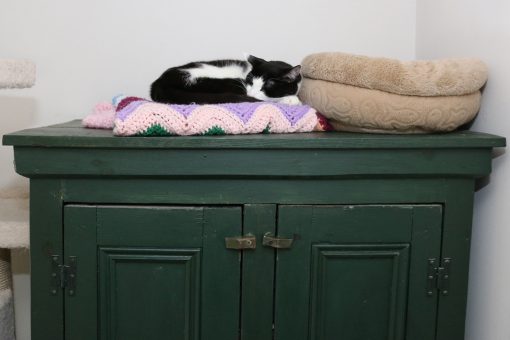
“Cats climb trees for two reasons: to survey their territory as hunters, and to escape as prey,” says Buffington. Give your cat access to high places in your home. This can range from expensive store-bought cat trees to simply clearing the top of a bookshelf for easy feline access. Some cats prefer to hide lower to the ground — under the bed, behind the sofa, or in a closet. Make sure your home has some high and low places, so your cat can find the safe refuge he or she requires.
Let them eat safe and secure
“Like other prey animals, cats are vulnerable when they’re eating,” says Brunt. “Instead of putting a food bowl against a wall, move it away about the length of the cat, so your pet can eat facing the room.” If there are other cats in the house, Brunt suggests leaving space in between feeding stations and, “if dogs share the home, consider feeding on a counter or designated table, so your cats feel safer.”
Encourage the hunter within
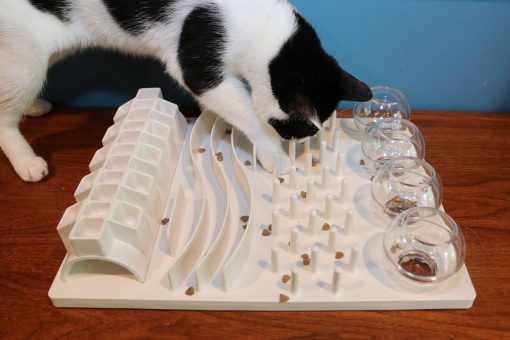
“For cats, hunting tends to take place in a particular order: Find. Stalk. Attack. Eat,” says Buffington. Try to encourage that order when playing with your cat. “Think how an injured bird or mouse might act,” he says, “and mimic that behavior with a cat toy.” Buffington is a huge fan of food puzzles, toys that encourage cats to figure out how to get food before eating it. “Studies show that animals — even humans — are happier when they can work for their meals,” he says. “If there’s one piece of ‘happiness advice’ I’d give cat owners, it’s to feed their cats with food puzzles.”
Keep it clean — litter-ally
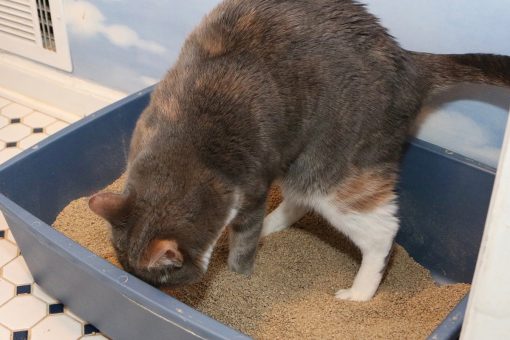
“Cats are fastidious creatures,” says Brunt. “Inside our homes, we want them to use litter boxes, but we need to do our part by emptying them at least once or twice a day.” It’s also important to ensure that access to litter boxes cannot be blocked by other cats, or at least to provide alternative locations. Experts recommend at least one litter box on each level of a home, or one more than the number of cats in the house.
Give them their space
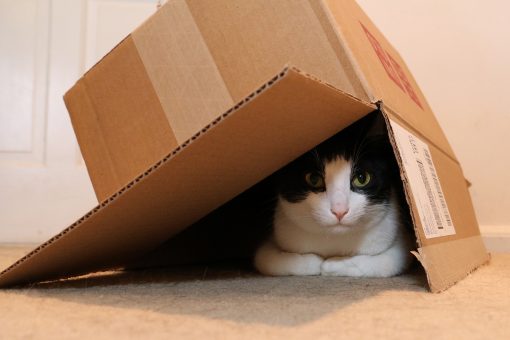
Whenever possible in multi-pet households, make sure each cat has access to a complete set of resources. “That includes food, water, litter box, and places to rest, scratch and climb — all out of sight of another cat,” says Buffington. Make sure their access can’t be blocked by another cat, even if you think your cats get along. “Conflict among cats is sometimes difficult for owners to see,” he says. “Even an action as subtle as a glance accompanied by a slightly different body posture can be a way for one cat to intimidate another.”
“We all can learn to think like a cat,” says Brunt. “And the best teacher is… your cat! Watch where he hides when startled. Pay attention to how she plays. Enrich his life with areas that make him feel safe and activities that play into her innate capabilities. This will help make your feline friend happier — and healthier.”
For more information and tips about ways to enrich your cat’s life, follow CATalyst Council on Facebook or Twitter, or the hashtag #HappyCatMonth throughout September.
Leave a Reply